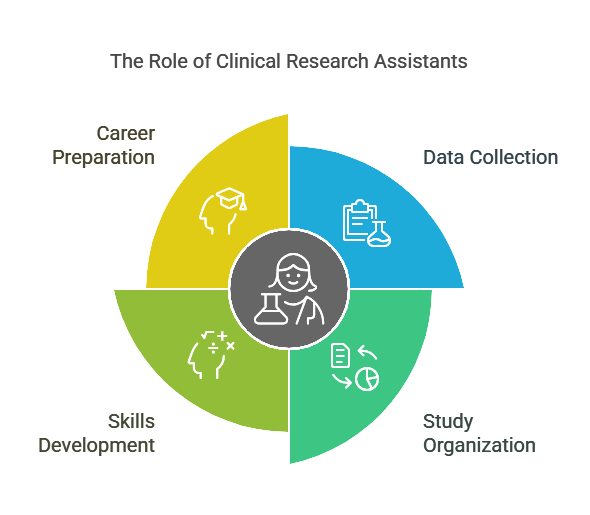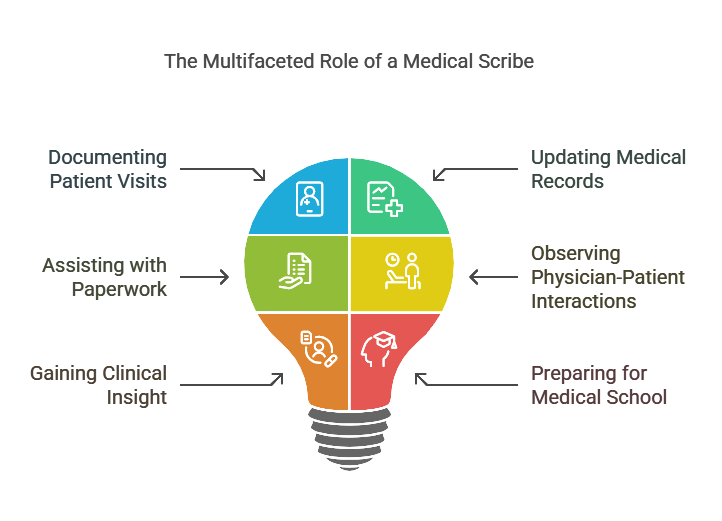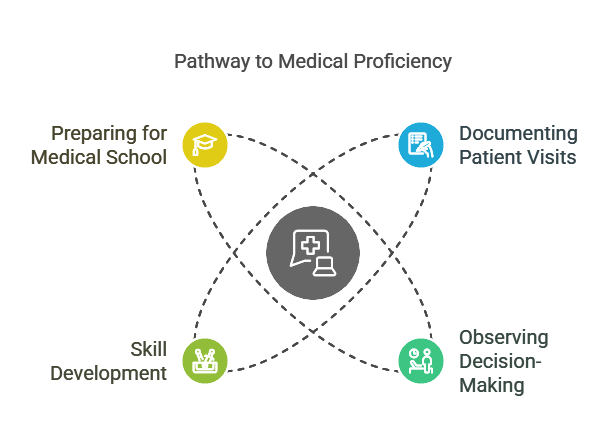Top 5 Jobs To Supercharge Your Medical School Journey
Are you a premed student balancing classes, activities, and the big dream of becoming a doctor? Between long study hours and shadowing opportunities, you might be wondering if there’s a way to get real healthcare experience while also making your medical school application stronger. The best part is you absolutely can! Working in a healthcare job before medical school not only helps you learn useful skills but also shows your commitment to the field. Medical schools look for students who have spent time in real medical settings, helping patients and working with healthcare teams.
Plus, these jobs can give you great stories for your personal statement, help you prepare for interviews, and even connect you with mentors who can guide you along the way. In addition to providing a salary, these positions help you get practical experience, enhance your resume, and get ready for a career in medicine. In this blog, we’ll go over five of the best jobs for premed students.
1. Beyond Note-Taking: Clinical Research Assistant
Clinical research assistants (CRAs) play a vital role in advancing medicine by helping doctors conduct clinical trials and analyze data. They ensure research studies run smoothly, collecting and organizing crucial information that leads to new treatments and medical breakthroughs. This job is perfect for premed students who want hands-on experience in research while sharpening their analytical, problem-solving, and organizational skills. It’s a great way to build a strong foundation for medical school.
Apply Your Science Knowledge: CRAs put their biology and chemistry knowledge to real use. They help collect and analyze medical data, follow research protocols, and monitor patient responses. This experience strengthens their understanding of medical research and prepares them for the scientific aspects of medical school.
Become a Master of Details: Research requires accuracy, and CRAs must keep detailed records of every step in a study. They ensure all information is documented correctly, which is an important skill for future doctors, as even small errors in patient records or diagnoses can have serious consequences.
Boost Your Resume with Impact: Working in clinical research makes a med school application stand out. It shows dedication to medical progress and provides real-world experience that can be discussed in interviews and personal statements. Being part of innovative studies adds value to an aspiring doctor’s journey.
2. Healthcare with a Business Buzz: Healthcare Consultant
Healthcare consultants play an important role in making hospitals and clinics more efficient. They analyze operations, identify problems, and develop strategies to improve patient care and financial management. This job is perfect for premed students who want to understand the healthcare system beyond direct patient care. By working in this field, students gain valuable skills in leadership, problem-solving, and critical thinking and all these qualities make them stand out when applying to medical school.
See the Big Picture: Healthcare isn’t just about treating patients; it’s also about managing resources and ensuring smooth operations. By working as a consultant, premeds learn how hospitals function, how policies affect care, and how financial decisions shape patient outcomes. This broader perspective prepares them for leadership roles in medicine.
Develop Leadership Skills: Consultants don’t just analyze problems, they also help to solve them. This role involves working with doctors, administrators, and staff to implement new policies and improve healthcare services. These premeds improve their communication, teamwork, and change-leading abilities, which are essential for every future physician.
Stand Out from the Crowd: Medical schools look for applicants with diverse experiences. Understanding the business side of healthcare sets premeds apart from other candidates. It shows admissions committees that they can think strategically, adapt to challenges, and contribute to improving the healthcare system as future physicians.
3. From X-rays to Expertise: Medical Equipment Technician
Medical equipment technicians play a vital role in healthcare by ensuring that essential machines, like MRI scanners, ventilators, and surgical lasers, function properly. Without them, hospitals and clinics wouldn’t be able to provide accurate diagnoses or perform life-saving procedures. For premed students, this job offers hands-on experience with medical technology, enhances problem-solving skills, and provides a deeper understanding of how equipment contributes to patient care.
Master the Machines: Advanced devices used for patient diagnosis and treatment are used by medical equipment technicians. Premeds are able to better understand medical technology by learning how devices like surgical robots, defibrillators, and X-ray scanners work. In the future, this information will be helpful for effectively utilizing medical technologies and understanding test findings.
Develop Problem-Solving Prowess: When medical equipment breaks down, technicians must diagnose and fix issues quickly. This role strengthens critical thinking, troubleshooting, and decision-making—skills that are essential for future doctors who need to think fast and find solutions in high-pressure situations.
Gain Practical Experience: Handling medical devices daily helps premeds become familiar with hospital environments and patient care procedures. This hands-on experience builds confidence, making it easier to transition into medical school and preparing students for the technical aspects of practicing medicine.
4. Building Bridges: Health Education Specialist
Health education specialists play an important role in keeping communities informed about health and wellness. They teach people how to prevent diseases, maintain healthy lifestyles, and access medical resources. This job is a great fit for premed students because it helps them develop strong communication skills, understand public health challenges, and make a real difference in people’s lives as they give you valuable experiences for a future doctor.
Become a Communication Master: Doctors need to explain medical conditions and treatments clearly to patients. As a health educator, you'll practice simplifying complex medical information, making it easier for different audiences to understand. This skill helps build trust and improves patient care, which is essential in the medical field.
Community Connection: Working in health education gives you firsthand experience with public health issues, such as access to medical care and disease prevention. Understanding these challenges will make you a more compassionate doctor and strengthen your medical school application.
Bridge the Gap: Many patients struggle to understand medical advice or follow treatment plans. Health educators help connect the medical world with the public by providing clear, practical guidance. This experience will prepare you to take a patient-centered approach as a future physician.
5. The Insider's View: Medical Scribe
A medical scribe plays a crucial role in healthcare by documenting patient visits, updating medical records, and assisting doctors with paperwork. This job is much more than just taking notes, it provides valuable firsthand experience in a clinical setting. Aspiring doctors gain insight into how physicians interact with patients, diagnose illnesses, and create treatment plans. This real-world exposure is an excellent stepping stone for medical school.
Witness Medicine in Action: As a medical scribe, you get a front-row seat to patient care. You observe how doctors examine patients, make diagnoses, and discuss treatment options. This real-world experience helps premed students understand the daily responsibilities of a physician and prepares them for medical school.
Master Medical Terminology: Scribes become fluent in the medical language by regularly documenting diagnoses, treatments, and procedures. This hands-on exposure makes learning medical terminology easier, giving aspiring doctors a strong foundation before they enter medical school. Understanding these terms early can also make coursework less difficult.
Develop Essential Skills: Scribing in a busy medical post that requires strong multitasking, time management, and attention to detail. Keeping up with patient charts and doctor’s notes sharpens organizational skills, which are critical for success in medical school and a future healthcare career.
Remember: When applying for any job, customize your resume and cover letter to highlight the skills and experiences most relevant to the position. Your passion for medicine will shine through!
Best Jobs for Premed Students: Gain Experience & Stand Out
Choosing the right job as a premed student can help you build valuable skills, gain hands-on experience, and strengthen your medical school application. The right work experience not only prepares you for the challenges of medical school but also helps you earn money while studying. Here’s what you need to know about pre med education and the best jobs to support your journey.
Premed students complete a four-year undergraduate program before applying to medical school.
While no specific major is required, common coursework includes biology, chemistry, physics, and neuroscience.
These courses help students meet medical school admission requirements and prepare for the MCAT.
Many pre med students take on jobs such as medical scribes, clinical research assistants, emergency medical technicians (EMTs), nursing assistants, pharmacy technicians, and medical receptionists.
Best Jobs for Premed Students
Medical Scribe – Scribes document patient interactions in real time, assisting physicians with paperwork and improving efficiency. This job offers direct exposure to medical terminology and patient care.
Clinical Research Assistant – Working under professors or researchers, clinical research assistants help conduct studies, analyze data, and contribute to medical advancements while earning stipends.
Emergency Medical Technician (EMT) – EMTs provide immediate medical care in emergencies. With proper training and certification, premed students gain hands-on experience in high-pressure situations.
Nursing Assistant – Nursing assistants help patients with daily care in hospitals, clinics, and nursing homes. This role develops patient interaction skills, which are essential for future doctors.
College Tutor – Tutoring college students in subjects like biology or chemistry strengthens communication skills while supporting medical knowledge.
Balancing a job with premed studies can be challenging, but the experience gained will make you a more competitive and well-prepared medical school applicant.
Health Care Experience (HCE)
Gaining hands-on experience in a healthcare setting can strengthen your medical school application and provide valuable insight into patient care and medical operations. Here are some key roles that offer meaningful healthcare experience:
Surgical Technologist – Assists surgeons during procedures by preparing sterile instruments, ensuring proper equipment setup, and handing tools as needed. This role provides direct exposure to surgical environments and medical teamwork.
Medical Receptionist – Manages front desk operations in a healthcare facility, schedules patient appointments, and handles inquiries. This position helps develop strong communication and organizational skills while providing insight into healthcare administration.
Pharmacy Technician/Assistant – Supports pharmacists by filling prescriptions, managing medication inventory, and handling paperwork. This role offers an understanding of pharmaceuticals, medication safety, and patient interactions.
Child Life/Patient Care Volunteer – Enhances the hospital experience for young patients by engaging them in activities like games and arts and crafts. While they do not provide medical care, volunteers help reduce stress and create a positive environment for hospitalized children.
Medical Records/Health Information Clerk – Organizes and maintains patient records, ensuring accurate documentation and efficient file transfers between departments and labs. This role is essential for maintaining the integrity of patient health information.
Medical Scribe – Works alongside physicians to document patient visits in real time, ensuring accurate and detailed medical records. Scribes also help update online records and coordinate with different departments to streamline patient care.
Patient Care Experience (PCE)
Achieving hands-on patient care experience is a great way to build essential skills and strengthen your medical school application. Various healthcare roles offer different levels of direct patient interaction, allowing you to develop clinical knowledge, communication skills, and a deeper understanding of patient care.
Certified Nursing Assistants (CNAs) – CNAs provide essential bedside care, including feeding, bathing, changing linens, and assisting patients with mobility. In some states and healthcare settings, they also measure vital signs and administer medication under the supervision of a licensed professional. This role offers valuable direct patient interaction.
Patient Care Technicians (PCTs) – Similar to CNAs, PCTs assist with bedside care. Certification requirements vary by state and employer, but certified PCTs often have more responsibilities, such as performing basic medical procedures and assisting with treatments. This role provides extensive hands-on patient care experience.
Medical Assistants (MAs) – MAs may handle both administrative and clinical tasks, depending on their training and workplace. Some focus on front-desk duties like scheduling and record-keeping, while others assist with patient care, including taking vitals, preparing exam rooms, and supporting medical procedures.
Patient Transporters – These professionals ensure patients move safely between different areas of a hospital or healthcare facility. They help transfer patients from rooms to testing areas or operating rooms, ensuring comfort and safety during transport.
Patient Safety Observers (Sitters) – Sitters monitor high-risk patients to prevent accidents, such as falls or IV dislodgement. They also assist with basic needs like eating, walking, or using the restroom, ensuring patient safety and well-being.
Phlebotomists – Phlebotomists specialize in drawing blood for testing, transfusions, or donations. They work in hospitals, clinics, and labs, mastering techniques for safe and efficient blood collection while helping patients feel at ease during the process.
How Medical Scribes Gain Valuable Clinical Experience
Medical scribes do more than just document patient visits—they gain firsthand knowledge of how doctors make critical decisions. Working alongside healthcare professionals, scribes develop essential skills that prepare them for medical school and beyond. Here’s how this role helps aspiring doctors:
Understanding Medical Decision-Making – Scribes learn how doctors diagnose illnesses by analyzing physical symptoms, medical history, and test results. This exposure helps them see the thought process behind each medical decision.
Learning Differential Diagnosis – They are introduced to differential diagnosis, where doctors consider multiple conditions before reaching a final diagnosis. By observing clinical reasoning in action, scribes develop the ability to think critically and rule out unlikely possibilities.
Interpreting Test Results – Scribes become familiar with lab tests, imaging scans, and medical reports. As they input data into electronic health records (EHR/EMR), they gain experience in understanding and organizing important patient information.
Exposure to Medical Billing and Insurance – By assisting with documentation, scribes learn how health insurance coding, medical billing, and reimbursement work. This knowledge is valuable for understanding the financial side of healthcare.
Observing Clinical Workflow – Scribes witness how experienced doctors manage busy clinical environments, handle patient flow, and adapt to high-pressure situations. This insight prepares them for the fast-paced nature of medical practice.
Developing Bedside Manner – Watching doctors interact with patients helps scribes understand the importance of empathy and communication in healthcare. This experience prepares them to handle emotional situations with confidence in their future roles.
Conclusion
Gaining hands-on experience in the medical field before applying to medical school is a game-changer. Whether working as a medical scribe, clinical research assistant, or healthcare consultant, these jobs provide valuable skills, real-world exposure, and a deeper understanding of patient care. Not only do they strengthen your medical school application, but they also help you build confidence, develop essential competencies, and form meaningful connections with mentors. By choosing a role that aligns with your interests, you can enhance your resume, earn valuable experience, and take one step closer to achieving your dream of becoming a doctor.
-
Consultant gains insights into the business side of healthcare, including operational efficiency, patient care, and financial management, which broadens their understanding of the healthcare system and enhances their resume.
-
As a Medical Equipment Technician, you develop problem-solving skills, gain hands-on experience with medical technologies, and improve your understanding of how medical devices contribute to patient care.
-
This role helps you develop strong communication skills, understanding of public health issues, and the ability to educate others, which are key to becoming a compassionate and effective physician.
-
helps in organizing and managing clinical trials, ensuring they run smoothly, and collecting and analyzing data. This experience is crucial for premed students looking to understand medical research.
-
A Medical Scribe documents patient visits, assists with medical records, and provides a front-row seat to patient care. This role exposes you to medical terminology, patient interactions, and doctor-patient dynamics, which are all valuable for medical school.









